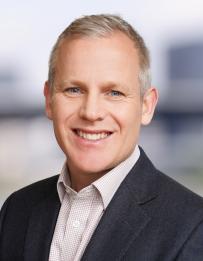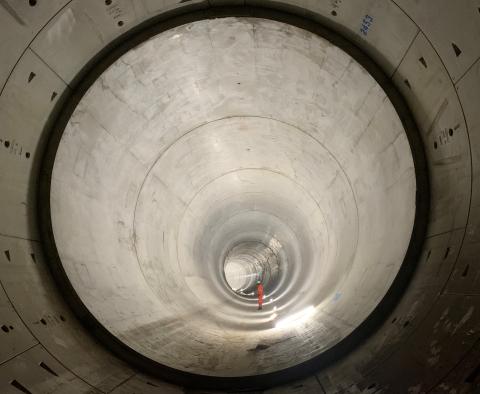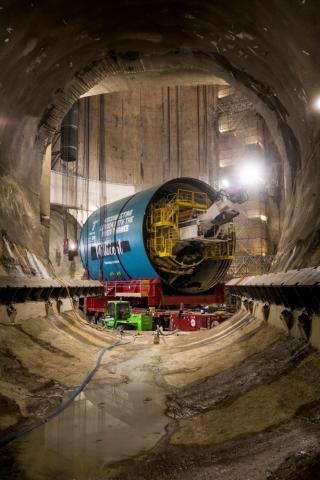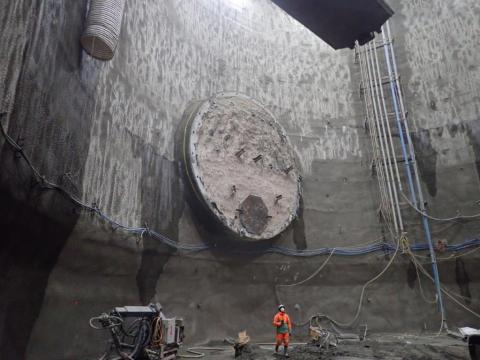Meet Roger Mears
London, England, U.K.

Channel Tunnel. New Doha International Airport. Crossrail. Tideway. The list of projects Roger Mears has contributed to reads like an engineering highlights reel. Working across sectors and country borders, Roger has gained global experience and leadership insights that now guide his current role as Delivery Manager on Tideway, the super sewer program based in the heart of London.
After studying civil engineering at the University of Bristol, Roger quickly began building on-site experience around the world — including Albania and Qatar — in roles such as contract administrator, field engineer and structures supervisor. That early contract administrator role proved a sign of things to come: Roger’s strength in risk and contract management, particularly within the NEC3 framework, would become a key differentiator in his career.
Today, Roger applies his leadership and unique skillset on Tideway, where he focuses on building empowered, problem-solving teams and encouraging innovation in the infrastructure sector.
“We rely on a constant test-and-learn approach. But more importantly, it’s about empowering the right talent at the right time. When you get that right, innovation follows naturally.”
Get to know Roger
-
20
Years delivering infrastructure projects
-
60 km
Length of tunnel construction involvement in London
-
4
Sectors of experience (water, aviation, highways and rail)
-
1
Wife met while working on a project in Albania
-
£ 600
Revenue on most successful day selling ice creams from a van in Devon
How do you help clients think differently to respond to future challenges?
It’s a balancing act. Program certainty depends on simplicity and proven processes — whether it’s a contract type, funding solution or way of working. But we also need to make space for innovation and new technologies on contracts, especially on complex programs like rail, where mechanical and electrical systems are critical. That requires adaptability and agility in both the team and stakeholders.
We rely on a constant test-and-learn approach. But more importantly, it’s about empowering the right talent at the right time. When you get that right, innovation follows naturally.
Creating a learning organization approach is also vital. People bring valuable experience from other programs. For example, many of the talented people I worked with on Crossrail now work with me on Tideway. That transfer of intellectual capital is invaluable when facing new challenges. These learning opportunities should also extend to your partners and supply chain. It’s far more effective to work with people who have lived through and experienced the lessons in practice versus trying to apply theories learnt from published guidelines or shared resources.
What’s the key ingredient for success on major programs?
Getting the balance of responsibilities and risk right at the start is essential for cost and certainty — especially when defining risk appetite and reward.
In most major programs, securing the right funding is difficult. That makes risk management within the contract critical. It’s affected by what the market can deliver and the availability of people, equipment, suppliers and willingness to take on risk.
Early decisions set the tone for everything that follows. Your delivery model needs to be well-defined from the outset to navigate shifting market conditions and unexpected obstacles. It takes experience to know which risks exist, who is best to manage them and how much should be passed to the supply chain.
What are the most essential skills that future program managers need?
I believe the first goal should be to get practical, on-site experience in one area of construction before aiming for management or senior roles. Having a foundation in design or quantity surveying, for example, helps build a broader understanding of project complexity and interdependencies.
Working internationally and with people from different sectors, backgrounds and cultures is also essential. It makes you a better listener and communicator, both critical skills as project teams become more global and diverse.
When you're not at work, what can we find you doing?
I have two sporty sons, so most of my free time is spent on the sidelines of a sports pitch in South West London. I also enjoy getting back to my native Devon and spending time outdoors on the Moors or by the sea.

















































